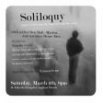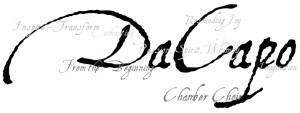
Every once in a while a concert comes along that takes music programming to another dimension.
Saturday night’s DaCapo Chamber Choir concert at St. John the Evangelist Anglican Church in Kitchener was a case in point.
Titled Soliloquy, music of refection: the lone voice and the crowd, the program featured cellist Ben Bolt-Martin as the solo voice.
Conductor Leonard Enns requested that the audience hold their applause until the completion of the first half, with the ideal that this be “a meditative moment in your life.”
True to its promise, the concert was skilfully programmed to heighten this agenda. Each work was carefully selected and performed to form a cohesive solitary unit. In this sense, the program essentially functioned as a single work strung together with individual compositions that complemented and heightened each other.
Setting the tone for the night was the excellent solo cello opener, Invocation by Enns. The expressively meditative work, which made full use of the cello’s dynamic range of pitch, was vividly handled by Bolt-Martin, whose musical use of glissandi, textured the composition with an exotic sensuality.
John Sanders’ The Reproaches was the standout performance of the night. DaCapo’s rendering of the work brought the meaning and emotion of the text (taken from the Holy Week Services by the Joint Liturgical Group) into the forefront. It was a deeply felt, powerful and moving experience.
Although the solo Cello Sonata by George Crumb was the only non-religious work of the night, within the context of the juxtaposing compositions, a modernist spiritual quality emerged. Rounding out the first half were two Christ-centred works: O Crux by the popular Norwegian composer Knut Nystedt and Brier by Canadian Jeff Smallman.
An exciting new composition by local composer Timothy Corlis commenced the second half. Based on a Margaret Atwood text (excellently narrated by Bruce Dow) the atmospheric work utilized light percussion, cello and soprano soloist (Shannon Beynon) for tonal colouring.
There’s lots of creativity in Corlis’ writing and, in particular, the passages following the narrative sections were atmospherically striking. Da Capo’s handling of the long sustained notes, repeated phrases and intensely soft passages created a trance-inducing and hypnotic bed in which the soloists meditation could freely flow above, strengthening the soundscape.
Enns noted that the score for Srul Irving Glick’s Yiddish Suite had been “sitting in the files of the Canadian Music Centre, collecting dust.” This is unfortunate. The chamber choir’s performance was convincing: the work has a broad appeal.




